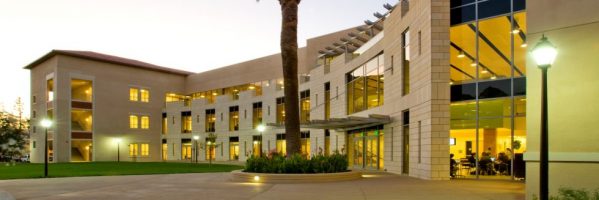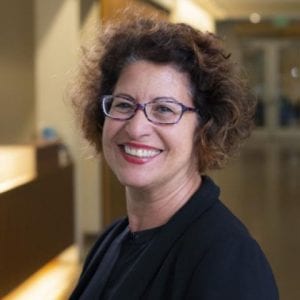Critical FAQs About the Cornell Tech MBA

What is the Cornell Tech MBA program? How do you know if it’s the right program for you? Recently, Adam Gavish, a Cornell Tech MBA alum, wrote about his experience and shared his opinions on LinkedIn. Here’s what he had to say.
What Makes the Cornell Tech MBA Different?
There are four key elements that make the CT MBA different than other programs.

- The Tech Industry: In this MBA program, you’ll get close to the tech industry, meeting and learning from hundreds of industry professionals. You’ll also dive into real-life experiences and learn tools from the tech industry.
- Hands-On Experience: As a Cornell Tech MBA, you’ll design mock UIs, implement proof-of-concept prototypes, conduct user research, explore product ideas, and more.
- Cross-Disciplinary Collabs: You’ll work with students from multiple MBA programs, computer science programs, and more to solve problems.
- Entrepreneurial Focus: From learning how to be a better public speaker to exploring customer empathy, you’ll gain entrepreneurial skills throughout the program.
Where Do Alumni Work?
After graduating with your Cornell Tech MBA, what type of job can you expect? According to Gavish, the program is best for product managers, whether at big or small companies. Alumni go on to work for a wide range of companies including Amazon, BlackRock, eBay, Google, MasterCard, Microsoft, Twitter, the Wall Street Journal, and more.
That doesn’t mean you can’t pursue a career in consulting, sales, or operations with a CT MBA, but you’ll gain the most experience in product management.
What About Post-MBA Recruiting?
When you graduate with a Cornell Tech MBA, you can rest easy knowing that you’ll have plenty of recruiting opportunities. Since the campus is located in New York City, you’ll have physical access to thousands of big tech companies and startups. You’ll also have access to the Cornell network, which is massive and incredibly helpful and giving. Last, but certainly not least, the CT Career Management Center is very well connected.
Risks of a One-Year MBA?
However, if you do decide to pursue the CT MBA, there are a few things to keep in mind.
- There is no summer internship, which can be negative for individuals who have never worked in the tech industry before and need extra experience.
- There’s also very little time to think about your post-MBA career during the program, so you have to plan and plan well.
- When you’re trying to cram full-time learning and course work into just 12 months, you can expect a lot of stress and hard deadlines.
See all that Adam Gavish had to say by checking out his post, here.
This article has been edited and republished with permissions from its original source, Clear Admit.
Santa Clara’s Sr. Assistant Dean of Graduate Programs Answers Our 5 Questions

In our latest installment of the MetroMBA “5 Questions” series, we speak with Toby McChesney, Ed.D., Senior Assistant Dean of Graduate Programs at the Santa Clara University Leavey School of Business. McChesney talks about the not-so-secret benefits of the school’s MBA programs, the benefits of learning in Silicon Valley, and a local can’t-miss spot you have to see.
1. What’s Something That People May Not Know About the Santa Clara Leavey School of Business MBA Program?
“At SCU’s MBA program, we put students first. Our professors, with their deep Silicon Valley connections, are dedicated to bringing cutting edge curriculum to the classroom. This dedication does not stop there—they want to get to know our students on a personal level, and with our small class sizes, they are able to do that. As full-time faculty, they are available to meet with students to support their academic and professional challenges. Students here at SCU are never a number, and our small but mighty admissions, career and program team work tirelessly to ensure our students are well taken care of.”
2. What Separates the Business School From the Others in the Region?
“When looking at various MBA programs in the area, students should ask themselves if they want to be an MBA student for a few years, or a ‘Bronco for Life.’ Here at SCU, our students are joining a community of like-minded professionals with strong values for integrity, collaboration and leadership. Unlike other programs where competition between students is high, SCU MBA students thrive in a supportive and cooperative environment. This sense of community makes SCU a unique place to learn business, as students learn from one another while applying the concepts they learn in class each evening. Given that 90% of our students are currently employed at top Silicon Valley Companies like Apple, Google, and LinkedIn, this make for a very powerful, yet supportive, learning environment. Also, there are more alumni from the Leavey School of Business living and working in the Bay Area than from any other business school, so the alumni network is unmatched.”
3. What Kind of Prospective MBA Applicant Should Consider Enrolling in Leavey?
“We are looking for applicants that have a strong academic background, not necessarily in business, professional work experience of at least three years and most importantly a generous attitude. We are looking for students who are ‘other-focused,’ and want to use what they learn at SCU to better their teams, their companies, their communities, and the world.”
4. What Unique Opportunities Do Students Have Enrolling in Leavey, Considering its Location in San Jose?
“Our location in Silicon Valley allows our MBA program to draw the cream of the crop to our faculty; we have CFO’s and Venture Capitalists co-teaching our courses. Each class has a Silicon Valley component woven into the curriculum, whether that be a real-time case project, or C-suite co-teaching a course in which they are experts. Santa Clara MBA students will benefit from Silicon Valley experiential learning as well as innovation and entrepreneurship.”
5. If You Can Only Pick One Restaurant in the Area, Where Would You Go?
“The Hut.

The Hut, a San Jose icon, reopened in June 2019 after a temporary three-year closure / Photo via Karl Mondon/Bay Area News Group
The Hut has been an iconic gathering place for all SCU students for many decades, it closed in December 2016 and has just reopened as a restaurant and bar.”
Wharton and WorkingNation Discuss Closing the Data Analytics Gap

What’s the next step for employers and educators who want to move the data analytics field forward? That’s the question that top industry leaders and educators discussed during a Wharton School town hall titled, “The Future is Now: Closing the Data Analytics Skills Gap.”
Put together by the Wharton Customer Analytics Initiative (WCAI) and nonprofit WorkingNation, the event kicked off with a keynote address by LinkedIn co-founder Allen Blue. He spoke about why it’s so important to fill the analytics skills gap before handing off the talk to further panelists from Comcast, PwC, the Gates Foundation, Penn Health, Morgan Stanley, and more. In the end, they all came to the same conclusion; data analytics job opportunities will continue to grow, so the need for data analytics skills will increase in proportion.

Panelists on stage (left to right): Ravi Kavikonda, Bhushan Sethi, Steve Kern, Kevin Mahoney (Penn Health) and Tsvi Gal.
The good news is that a valuable data skillset can come from different backgrounds. According to Blue, “Data scientists who came from physics or biology discover and invent new things, whereas somebody who came from a data science program would use a tool they already knew about.” Even history and English majors have the creativity, critical thinking, and high EQ to work in the data analytics field.
However, opening up data analytics positions to a broader range of backgrounds is only the first step. There’s also a need to close the gender gap and to enrich data analytics education, which means building it into core curricula as early as possible. Melanie Harris, the Chief Information Officer of the Philadelphia School District, spoke about the K-8 digital literacy program, and how it’s introducing the gamification of coding by the second grade.
But what needs to be at the forefront of all this change is employers hiring people based on skills over pedigree. According to Jake Schwartz, the Co-Founder and CEO of General Assembly, “I think in the future, we’re going to find really creative ways of putting together talent needs with potential alternative pools of talent, and figuring out how to use education as a bridge to get people [where] they want to be and where the companies really need them.”
Read the full report and watch clips from the panelists here.
This article has been edited and republished with permissions from its original source, Clear Admit.
These Tech Companies Are Looking Out for More MBA Talent

LinkedIn may be one of the go-to places to grow a professional network and find job listings, but it’s also an MBA recruiter. Check out this list of exciting new MBA jobs at LinkedIn, as well as a handful of other tech companies, and see how well your resume lines up with these job descriptions. Continue reading…
KSU Opens New Location, Blackstone Exec Addresses McDonough Grads, and More

Let’s take a look at some of the biggest stories from this week, including the a new Coles MBA classes held in Sandy Springs.
Kennesaw State To Offer MBA Courses in Sandy Springs, GA – Sandy Springs City News & Media
Next fall, Kennesaw State University’s Michael J. Coles College of Business will expand its MBA course offerings to Sandy Springs, GA. This will be the school’s third location.
MBA courses are currently offered at the Kennesaw Campus and the Cobb Galleria. The campus’ new extension is the result of a partnership between Kennesaw State, the City of Sandy Springs, and its Chamber of Commerce. Robin Cheramie, Coles Interim Dean, announced the new offerings. “We are thrilled to be opening our doors to the business community in Sandy Springs. The partnership … creates more opportunities for KSU to provide career-enhancing education to Atlanta’s business population.”
Increased demand for part-time MBA courses in Atlanta’s metropolitan area was the catalyst for the Sandy Springs location, which was first announced in April 2018. The area has a high number of working professionals who will greatly benefit from the chance to complete their studies without interrupting work schedules.
Sandy Springs Chamber of Commerce Tim Mahaffey says, “With the KSU program located [here], employees will have the convenience of leaving their workplace and being in their classrooms within minutes.”
You can read here for more on the new Kennesaw State University MBA classes.
Blackstone Executive to Address Georgetown McDonough Graduates – Georgetown University Newsroom
Georgetown University McDonough School of Business alum Joseph Patrick Barratta II, (B ’93) will deliver the commencement address on May 17, 2019.
Barratta is a Senior Managing Director and the Global Head of Private Equity at Blackstone. After joining the firm in 1998, Barratta advanced quickly to help establish its European corporate private equity business in London. Over his two decades with Blackstone, he has been responsible for many of its most significant private equity transactions.

McDonough alum and Joseph Patrick Barratta II, the Senior Managing Director and the Global Head of Private Equity at Blackstone, returns to his alma mater on Friday, May 17, for the business school’s 2019 commencement.
A trustee of the Tate Foundation, Barratta also serves as a board member of Year Up, which assists youth with employment training. Among his service commitments to Georgetown are his membership of the University’s Board of Directors and the McDonough Global Business Initiative Advisory Board. Along with his wife, Abigail, he established the Baratta Endowed Global Business Education Fund and the Baratta Endowed Chair in Global Business. For more on 2019 Commencement events at Georgetown McDonough School of Business, click here.
Celebrating 10 Years of Leeds’ VITA Program – UC Boulder Leeds School of Business News
Students at University of Colorado’s Leeds School of Business have put their knowledge to work by assisting residents with annual tax returns.
The IRS sponsored Volunteer Income Tax Assistance (VITA) Program provides low-income Boulder residents the opportunity to file their tax returns with one-on-one help from business and law school students. Throughout the ten year program, residents have received $4 million in refunds, $1.3 million in earned income tax credit and $700,000 each in education tax credits and child tax credits.
In order to volunteer, students must first receive a certification from the IRS, and each return is checked by other volunteers who are well versed in tax law. Susan Morley, Senior Accounting Instructor and Faculty Advisor of the Leeds’ VITA program says:
“It is a very humbling and rewarding experience to provide this valuable service to the community. We are excited to continue this service in the future, and we know our students and community volunteers are excited to continue to serve Boulder County.”
To be eligible for assistance, residents must earn less than $54,000 per year. Those with disabilities and non-English speaking residents are also eligible. Read more about VITA and Leeds’ community service efforts here.
Key Strategies for Updating Your LinkedIn Profile – UNC Kenan-Flagler News
A recent discussion at UNC Kenan-Flagler Business School addressed a question we’ve all asked: how can I make LinkedIn work for me?
Megan Parker, Senior Associate Director of Coaching in UNC Kenan-Flagler’s MBA Career and Leadership team, offered a number of key guidelines for making the most of the professional networking site. Among them were how to create a profile that’s effective, how to optimize the site for networking, and perhaps most importantly, what recruiters and employers are seeking when they use LinkedIn.
The goal, she says, is to first shape your profile to match what recruiters are looking for, and then to focus upon your unique skills. Crafting the right headline, using your LinkedIn summary to reach your target audience, and using your profile to share content and updates relevant to your profession all increase your visibility, Parker said.
The talk was part of UNC Kenan-Flagler’s 2019 Alumni Weekend.
5 Questions With UC Davis MBA Admissions Senior Director Andrea Shaw

In our latest installment of the MetroMBA “5 Questions” series, we speak with Andrea Shaw, Senior Director of Admissions at the UC Davis Graduate School of Management. Shaw discusses the tight-knit culture of the UC Davis MBA program, what students can expect, and what qualities define the program.
How does UC Davis help MBA applicants who don’t come from a traditional business or quantitative background?
“Students come to us from across industries, functions, and from around the world. We pride ourselves on being a tight-knit and collaborative community where conversations directly happen between faculty, staff, and students. Our curriculum also allows students to choose between many different career paths especially given the connections we have across other UC Davis schools.
For students coming from a non-business background or who are nervous about starting, we’re a school that really fits. Many schools have 600 students in a full-time program. We only have 50 students. That allows us to personalize the journey of each student.
Also, UC Davis doesn’t believe in just throwing our students into the program. We get to know our students and their needs—what they’re looking for, their strengths, weaknesses, etc. Part of that knowledge comes from our highly robust orientation where we spend almost a month before school starts to really engage with our students.

Andrea Shaw, Senior Director of UC Davis Graduate School of Management Admissions
During orientation, we spend a tremendous amount of time learning about our MBA class. There’s a significant career focus with discussion topics focused on networking, resume building, LinkedIn, etc. However, what the orientation is most known for is helping our students understand their emotional intelligence and develop their story through exercises and experiential learning.
Students have said in surveys that it’s the orientation that solidifies that they’ve made the right decision to come here. Those first few weeks are critical for setting them up for success.”
What type of culture defines UC Davis?
“The two words that continually come up from students, alumni, and faculty are “kind and compassionate.” We are driven toward success, but nice. It’s the idea of compassionate leadership, which research has shown to be necessary for true business growth. We even have an entire series that students can take to develop these skills, including awareness of themselves and others. Kindness and compassion are woven into every aspect of our culture, starting at the top with our dean.
Our culture is also defined by our location in a college town instead of a city. I love Davis as a city, community, and a place to go to college. It’s safe, comfortable, and all the energy revolves around the college.
We’re also really focused on what we do best as a university—biotechnology, sustainability, agriculture. Those sorts of segments and industries are very tied to our culture, university, and research. So, someone interested in Wall Street finance might not fit as well as someone interested in biotech.
Finally, because we’re a small community, you can really stand out. There are not a lot of politics to hold you back. You can get very involved, and there are fewer people vying for the same positions, so you can do as much as you want. This is highly beneficial for students who have a particular passion that they want to explore. For example, I know an MBA student who started a Women in Leadership organization because that was something she was passionate about, and it happened in a few conversations.”
Can you describe the qualities that UC Davis students possess?
“Other than the typical GMAT scores, GPA, and years of work experience, we look for applicants who know what they want to do with their MBA. Candidates should have a focus for the post-MBA career while also remaining open-minded about new opportunities. After all, an MBA is meant to be a transformative experience.
We also look for highly competent individuals who are professional in their verbal and written communications with us. We pride ourselves on being able to find jobs for all our students, so there’s a benchmark we look for—well-rounded students that have many different qualities. Going back to this idea of collaborative and kind, we look for candidates who are good team players and who see the value of working in groups because we have a lot of group work.
Finally, we look holistically at the class and how everyone will learn from each other. We look for a diverse class with students from a wide variety of backgrounds and industries. Everyone should be unique while still representing the essential qualities we love: kindness, compassion, and collaboration.”
If you could give one piece of advice to an MBA applicant interested in UC Davis, what would it be?
“Confidence! So much of what MBAs lack is confidence. The problem is that if you don’t think you can succeed, you won’t.
When you fill out your application and come in for your interview, we want confidence. Confidence is doing your research (knowing UC Davis), knowing who you are, and knowing your story. It’s also about being authentic. All of that leads to being confident in who you are and what you want. That will come across with us; it will come across anywhere.

“Confidence! So much of what MBAs lack is confidence. The problem is that if you don’t think you can succeed, you won’t,” Shaw says.
Remember, first impressions matter. That’s where that confidence helps too. If you come into a situation confidently, those first impressions are strong.”
What is your favorite San Francisco-focused business blog/website?
“I would say for applicants who are looking at schools in the Davis area, Metro-Edge.org is an excellent website. This is a website for young professionals in the Sacramento area. You’ll find events, gatherings, news, and more. It’s really focused on change and responsibility, and that’s great.
I also have to give a little plug to all of our social media accounts. Follow us on LinkedIn, Twitter, and Facebook for the latest news and insights. We also have MBA Showcase days coming up on January 26, February 9, and Feb 23.”
